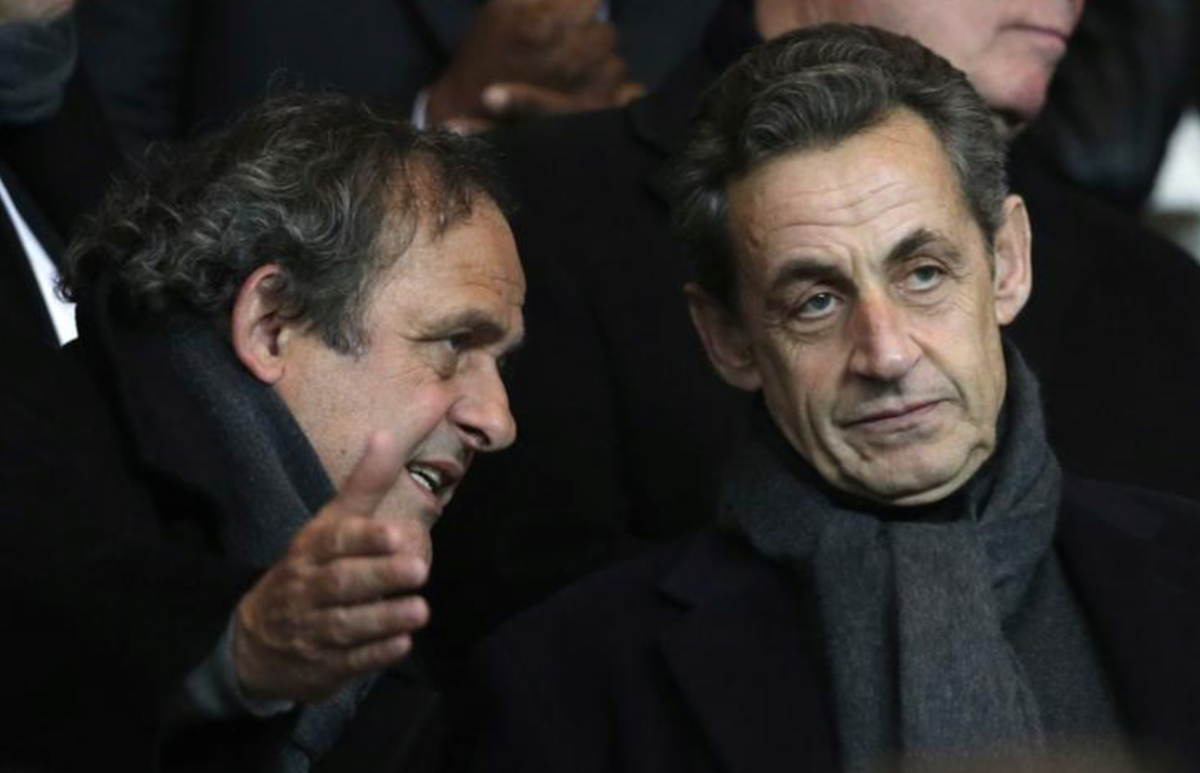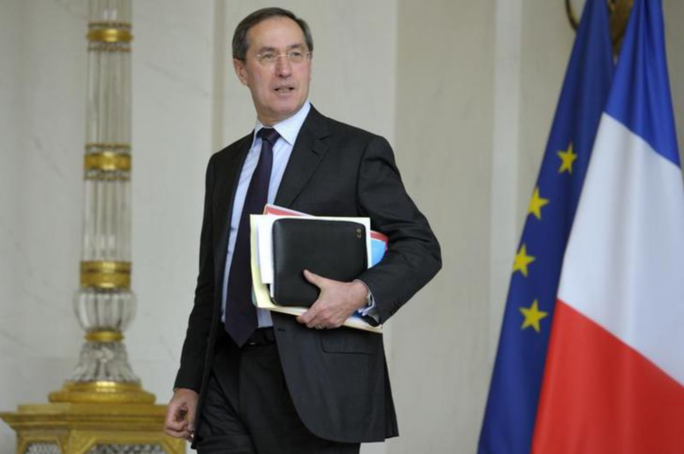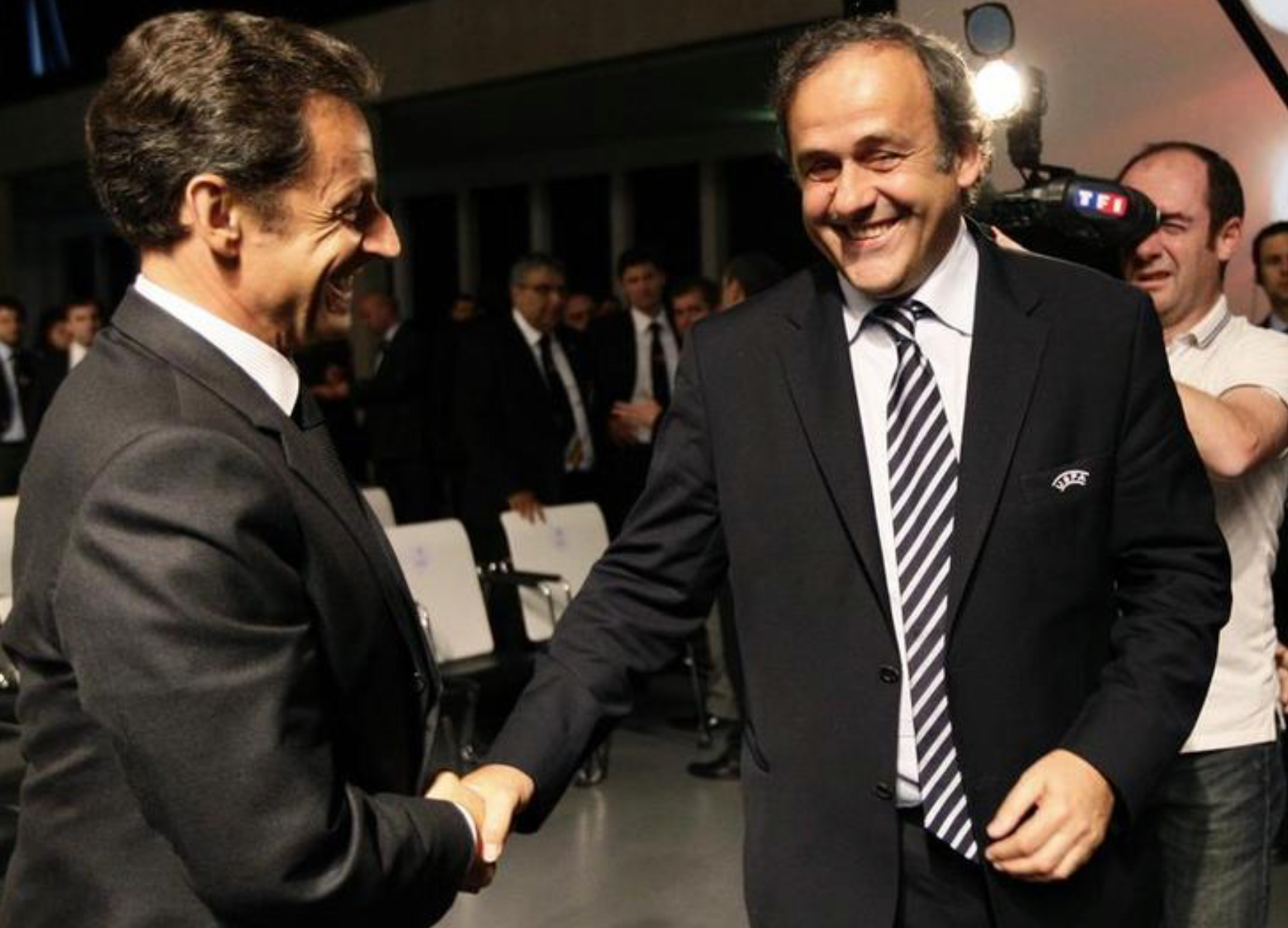Key documents seen by Mediapart shed potentially crucial new light on the controversial award of the 2022 football World Cup to Qatar. The documents relate to a lunch held at the French presidential office, the Élysée Palace, in 2010 just before the vote on which country should host the event.
The gathering included then French president Nicolas Sarkozy, key figures from Qatar and the boss of European football ruling body UEFA, Michel Platini, who eventually cast his vote in favour of the Gulf state hosting the World Cup.
The documents came to light during a preliminary investigation carried out by the French public prosecution services’ financial crimes branch, the Parquet National Financier (PNF) over suspected corruption in the 2010 award of the 2022 tournament to Qatar.
The documents were found by police officers from the anti-corruption unit OCLIFF during a search of the home of Sophie Dion, who in 2010 was an advisor on sport to the French president. Dion, a lecturer at Paris I-Panthéon-Sorbonne university, a lawyer with the legal practice Fidal, and also an arbitrator at the Court of Arbitration for Sport (CAS) based in Lausanne in Switzerland, is an authority on legal affairs in sport. She also has a close interest in Qatar.
When in 2012 she became a Member of Parliament (MP) for Sarkozy’s conservative Les Républicains party (then called the UMP), Dion took on the role of vice-president of the France-Qatar friendship group in the National Assembly, Parliament’s lower house. In March 2012, just two months before she left the Élysée as an advisor, Qatar funded a chair on sports ethics at Paris I university where she runs the Masters course in sports law.
During the poliuce search,detectives discovered that Dion kept memos at her home that she had written at the Élysée in 2010 for Sarkozy and his chief of staff Claude Guéant. Under normal practice, these should have been handed over to France’s national archives institution.

Enlargement : Illustration 1

These key documents are today at the heart of the current judge-led investigation into evidence of “corruption” over the attribution of the 2022 World Cup to Qatar. The judicial investigation was ordered in December 2019 following the findings of the PNF's three-year preliminary probe.
Sophie Dion, Claude Guéant and Michel Platini were all asked about the memos when they were questioned by officers from OCLIFF on June 18th 2019.
Mediapart has obtained information on the content of Dion’s memos. They detail, from the inside, the secret campaign led by Sarkozy – whose government at the time enjoyed particularly harmonious relations with Qatar – to have the World Cup awarded to the Gulf state at a vote by football's world governing body FIFA on December 2nd 2010.
The memos reveal that the lobbying operation in favour of Qatar had started at the beginning of 2010. In March that year, the Élysée contacted UEFA boss Michel Platini, a former French football star, on the subject. In her memos, Dion wrote that Platini had initially been “reluctant” towards backing Qatar's bid, but had apparently changed his mind during a lunch organised at the French presidential office on November 23rd 2010, just ten days before the FIFA vote.
Present at the lunch gathering were Nicolas Sarkozy, Claude Guéant, Sophie Dion, Tamim bin Hamad Al-Thani, then Crown Prince of Qatar and now the Gulf state’s ruler, and the then Qatari prime minister Hamad bin Jassim Al-Thani.
The memos strengthen previously reported suspicions that a pact was agreed during the Élysée lunch. According to a 2013 investigation published by the magazine France Football, there was allegedly an agreement that Qatar would buy the Paris football club PSG and create a sports channel in France – BeIN Sports - “in exchange”, reported the magazine, “for a promise: that Platini would not cast his vote for the United States, as he had envisaged, but for Qatar”.
Contacted by Mediapart, Michel Platini, Nicolas Sarkozy, Claude Guéant and Sophie Dion did not respond.
Platini, who was forced to step down as UEFA president in 2015, has over time changed his public statements on the events concerning the Élysée lunch. In 2014, Platini told French sports daily L’Équipe, and also TV channel France 2’s current affairs programme 'Complément d’Enquête', that it was “Sophie Dion, who's in charge of sport at the Élysée” who had asked him to “come and lunch with the president of the Republic” (see video below). He stated that Nicolas Sarkozy had not explicitly asked him to vote for Qatar but that he had given him a “subliminal message”.
But in December 2017, during his initial questioning by police, Michel Platini gave a quite different version, as revealed by L’Équipe. “It was I who had called Sophie Dion to ask for a meeting with Nicolas Sarkozy in order to announce to him for whom I was going to vote,” said Platini. In June 2019 the ex-UEFA boss told Le Monde: “I knew that I was going to vote for Qatar before the lunch and I went to see Nicolas Sarkozy to tell him.” That indicated there would have been no need during the lunch on November 23rd 2010 to convince him over his vote.
However, that version is contradicted by what Sophie Dion wrote. She wrote three memos to Nicolas Sarkozy to prepare for the lunch, which were about Qatar's bid for the 2022 World Cup, Michel Platini's re-election as UEFA president and his potential candidacy to become FIFA president in May 2011 – though in the end Platini did not stand and supported the incumbent president Sepp Blatter.
In one of the memos written before the lunch, Nicolas Sarkozy's sports advisor noted that there was a “reluctance on the part of Michel Platini to support Qatar”. In a second memo, written after the Élysée lunch, Dion wrote that the UEFA president had displayed reservations over the Qatar bid during the first part of the meeting, but that he had become “more favourable” during the second part.
Claude Guéant's lawyer, Bouchez El-Ghozi, told Le Monde that there were two parts to the meeting. “Mr Gueant […] greeted the Qatari delegation and Mr Platini and attended to them during an aperitif in a room next to the dining room, while waiting for Mr Sarkozy,” said the lawyer. “Mr Guéant remembered that the aperitif went on for a while. Then Mr Guéant and Mrs Dion slipped away.” The lawyer said that his client had thus not lied when he said he had not taken part in the lunch.

Enlargement : Illustration 3

According to Sophie Dion's memo, it would seem that Michel Platini was reluctant about supporting the Qatar bid at the aperitif stage, and “more favourable” after the lunch with Nicolas Sarkozy and Crown Prince Tamim bin Hamad Al-Thani, who became the Emir in 2013.
Under questioning, Sophie Dion told police that she had not taken part in the lunch. But her presence at the Élysée that day is confirmed by the table plan recorded in the Élysée archives and also by Michel Platini's evidence.
Sophie Dion's memos appear to support accusations made in public by the former FIFA president Sepp Blatter. He stated that Platini had agreed with his plan to vote for Russia's bid for the 2018 World Cup at the 2010 meeting, and for the United States for 2022. But that after the lunch at the Élysée the UEFA boss had called him to tell him that he had changed his mind and would support Qatar because he had been “asked to vote for French interests”. Platini confirmed that this phone call took place but he denied Blatter ‘s version of the content of it. Platini said that Blatter was lying to punish him for having sought to take over from him as boss of FIFA.
But in an interview with Associated Press, the former French football star himself admitted that he “might have said” to United States representatives that he would vote for them, before changing his mind.
Mediapart understands that Platini met Sunil Gulati, the president of the United States Soccer Federation (USSF), at UEFA’s headquarters in Nyon, in Switzerland, at the end of September 2010. As Le Monde has already revealed, at the time the UEFA president asked Gulati to withdraw the US bid for 2018 because he wanted to favour the European bids, and suggested that the US would then have a good chance of receiving his support for 2022.
The Americans agreed and withdrew their candidacy for 2018 on October 15th 2010. A month later Michel Platini went to the lunch with senior Qatari figures at the Élysée. According to several American sources, the president of USSF only learnt at the beginning of December 2010, in another meeting with Platini just before the vote, that the UEFA boss had changed his mind and that he would be voting for Qatar.
Contacted by Mediapart, Sunil Gulati declined to comment.
Other memos written by Sophie Dion show that the presidency began its lobbying operation in favour of Qatar from the spring of 2010 just after an initial lunch at the Élysée between Nicolas Sarkozy and Qatar's then Crown prince Tamim bin Hamad Al-Thani. The crown prince was at the time president of the Qatar Olympic Committee, a member of the International Olympic Committee (IOC), and in charge of a Qatari programme to win the right to host the biggest sporting events in the world, including the World Cup and the Olympics.

Enlargement : Illustration 4

On February 3rd 2010, Tamim al-Thani was received with great ceremony at the Élysée by then-president Sarkozy, who invited him to lunch and conferred on him the title of “grand officer” of the Légion d'Honneur. “They discussed the issue of [Paris football club] PSG when they met,” Sarkozy's official spokesperson, Franck Louvrier, told French daily Libération in 2011.
A short time after the early February 2010 reception for Tamim al-Thani at the Élysée, Sarkozy's chief of staff Claude Guéant asked Sophie Dion to contact Michel Platini and FIFA president Sepp Blatter to raise the issue of Qatar's bid. In a note to Guéant dated March 10th 2010 and titled “Organisation of the football World Cup in Qatar in 2022”, Sophie Dion confirmed to him that she had been able to speak to the two men.
However, Dion counselled patience, because France was in the final stages of the battle to host the Euro 2016 football tournament, which was due to be awarded by UEFA on May 28th 2010 at a meeting in Geneva. “Would it not be more rational to wait for UEFA's decision?” wrote Sophie Dion. “We could then raise even more directly the question of Qatar hosting the 2022 World Cup. Michel Platini in particular would like to be able to talk about this with the [French] president.”
That memo is significant because Dion mentions Platini's desire, as of March 2010, to discuss the Qatari bid with Nicolas Sarkozy, nine months before the vote.
Neither Michel Platini nor Nicolas Sarkozy responded to Mediapart's requests for comment on the matter.
A spokesman for Sepp Blatter said Blatter “does not remember” any discussion with Sophie Dion at the start of 2010 about the Qatari bid.
Questioned in police custody in June 2019, Platini was also asked about the awarding of Euro 2016, which was narrowly won by France when it received 7 votes in the second round against 6 for Turkey. Because of his French nationality, the UEFA president was not allowed to take part in that vote.
Platini was accused by Senez Erzik, the Turkish vice-president of UEFA, of having helped France’s candidature. During a visit to UEFA’s headquarters in Switzerland to promote France’s bid, Sarkozy was introduced by to UEFA’s executive committee, whereas Turkish president Abdullah Gül, when he made a similar trip, was not. Platini later said that the narrow final vote in favour of France demonstrated that it had been “democratic”, and that Sarkozy’s visit had “tipped the balance”.

Enlargement : Illustration 5

In the French judicial investigation opened last month, no-one has yet been “placed under investigation” – a French legal move that precedes charges but which implies serious or concordant evidence has been found that an individual committed, or helped to commit, a crime. The judicial probe is notably seeking to establish whether there were return favours agreed between the parties present at the November 2010 lunch at the Élysée.
In the months following that lunch, Qatar, via its sovereign investment fund QSI, bought the PSG football club and created the BeIn Sport media in France. Meanwhile, Platini’s son Laurent was appointed as the head of Burrda, a sports accessories subsidiary of QSI. Platini has firmly denied any involvement in his son’s appointment with Burrda.
Meanwhile, after leaving her job in May 2012 as sports advisor at the Élysée, Sophie Dion became an MP in legislative elections in June that year as an MP for Sarkozy’s UMP party (now Les Républicains) and became vice-president of the France-Qatar friendship group in the National Assembly.
In March 2012, the International Centre for Sport Security, the ICSS, a not-for-profit body funded by Qatar and based in the Gulf state's capital Doha, created a chair for “Ethics and security in sport” at the Paris I-Panthéon-Sorbonne university where Dion leads a Master’s course in sport laws.
In its series of investigations based on information provided by data from Football Leaks, Mediapart has previously reported on questionable practices of the ICSS, notably concerning the surveillance of rivals of Qatar in the world of sport, and revealed how it paid the Sorbonne university a yearly 150,000 dollars for the chair (see the full report here).
Contacted by Mediapart, the Paris I-Panthéon-Sorbonne university said the ICSS provided it with between “100-150,000 dollars per year”, but that the chair was closed in 2017 and is still no longer active. “Sophie Dion was never involved in the management of the chair. Nor was she involved in the initiative for it,” the university added.
Sophie Dion did not respond to Mediapart’s request for comment.
-------------------------
If you have information of public interest you would like to pass on to Mediapart for investigation you can contact us at this email address: enquete@mediapart.fr. If you wish to send us documents for our scrutiny via our highly secure platform please go to https://www.frenchleaks.fr/ which is presented in both English and French.
-------------------------
- The French version of this report can be found here.
English version by Michael Streeter and Graham Tearse


